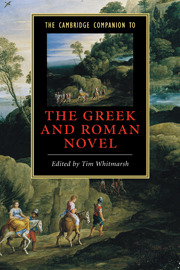6 - Religion
from Part II - The world of the novel
Published online by Cambridge University Press: 28 June 2008
Summary
Religion plays a central role in the plot of virtually every ancient fictional narrative, influencing the lives, actions, mentality, practices, beliefs and eventual fates of the characters (and narrators); the types, interventions and motives of divinity or other uncanny forces; the use of mythological exemplars, and more broadly, the array of problems that the entire subject poses for interpretation of the genre's conventions. The novels are full of: temples, shrines, altars, priests, rituals and offerings, dreams (or oracles), prophecies, divine epiphanies, aretalogies, mystic language and other metaphors of the sacred (not forgetting, in addition, exotic barbarian rites). Indeed, religious elements, such as these, familiar to virtually any inhabitant of the ancient world, are richly attested, of course, in history and archaeology. The topography of any ancient city, for example, would be unrecognisable without its temples and shrines, its statues and votive offerings, its frequent public festivals and processions, and its generally familiar modes of worship. Such is the case in the novels, for all their differences, in which its characters range far and wide in the course of their wanderings and communicate with the sacred in these habitual ways, whether in the cities of Asia Minor (Ephesus, Miletus, Rhodes, Sidon, Byzantium), Egypt (Memphis, Thebes, Alexandria), Greece (Delphi, Corinth), Italy (Syracuse, Rome) or elsewhere.
- Type
- Chapter
- Information
- The Cambridge Companion to the Greek and Roman Novel , pp. 91 - 108Publisher: Cambridge University PressPrint publication year: 2008
- 4
- Cited by



